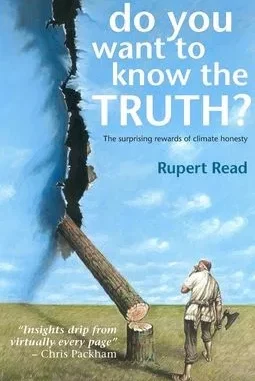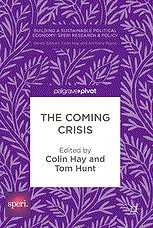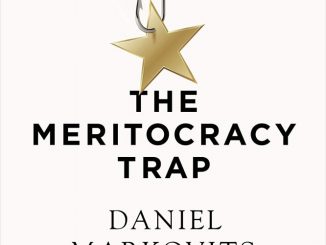
Book Review by Alison Teal
Honesty is the key word for Rupert Read’s new book Do You Want to Know the Truth?
Rarely is this book what one would consider ‘light’ reading. Collecting some of Read’s most prominent writings over the last few years with an original introduction and conclusion which serve to tie the writings together, Read delivers perhaps his most damning account of the coming future of climate chaos, yet does so with compassion and a call to action so forceful that the reader can’t help but be motivated to be part of the change we so desperately need.
Read challenges you from the first few pages and asks you a single question – do you really want to know the truth? If the answer is ‘yes,’ as it must and will be for a great many people, then you will have to deal with the pandora’s box that comes with confronting the depressing truths of climate change. Indeed, pandora’s box is an apt metaphor for this book. After agreeing to confront the truth the reader will go through a slew of difficult chapters that will challenge the outlook of even the most infectious of optimists. Nevertheless, Read makes sure you are left with one thing: hope.
A commendable strength of this book is that it is written with sympathy and empathy from a man who clearly wishes that his words weren’t true. The subject of climate degradation is a difficult one to discuss, and indeed that is why so many people willingly ignore it or at least don’t confront the difficult repercussions of it, and Read knows this. The result is that the reader is not left alone to confront the most horrifying of truths; the author is aware of the hurtful nature of confronting climate reality, and is always sure to recommend action so as to not to leave the reader in a state of despair. Indeed, often Read recounts his personal struggles in facing up to ecological collapse, and this empathetic writing style acts as a companion to a reader who may be realising the dire nature of our epoch for the first time. Discussions around our climate-change-impacted future are extremely difficult to have, but they are also so vital. This book offers a resource that could encroach the subject to people who have so far avoided it precisely because it is sympathetically written.
The writing is stark, as can be expected given the subject matter, but the real triumph of this book is Read’s ability to seek out causes for hope in a sea of hopelessness. Where others could easily fall into paralysed nihilism or despair, especially after chapters like “why I had to tell my students that I fear for them” and “what else would you have me do,” Read urges us to recognise that an honest reflection of climate collapse could be an invigorating tool for advancing the global climate movement. Indeed, Read recognises that a central tenet of organisations such as Extinction Rebellion and Fridays for a Future was their call to tell the truth, unabated and unabridged, to the public. The success of those organisations lends weight to the argument that truth-telling has a real power to cut through the endless tirades of rubbish espoused by politicians and world leaders and inspire real change.
If you agree with Read’s synopsis of the situation, then you are faced with another question; why isn’t this being treated as an emergency? Read documents government responses to other emergencies such as the COVID pandemic or the Russian invasion of Ukraine showing the abundance of resources that can be mobilised at short notice if the situation is treated with the appropriate gravitas. The issue is a lack of will from governments to face up to the climate emergency and take the appropriate actions. Indeed, Read argues we should stop referring to it as an ‘emergency’ until we are ready to treat it as such. The trick, then, is to be able to convince governments to view climate change with the same level of importance as these other emergencies, and to do this you need the mass mobilisation of the public, which Read also explores and advocates for.
It is easy to answer ‘no’ to Read’s question of whether you want to know the truth. It would be lovely if we could bury our heads in the sand, pretend that climate chaos is not here or does not affect us, and not open the pandora’s box of climate honesty, but in the end we must face up to our duty as responsible citizens to confront the truth, because only from such truth can we decide where to go next. Herein lies the importance of this book; it’s not one to curl up in front of the fire with this Christmas, it’s not a page-turner thriller where you can’t wait to find out what happens next, it’s not comfortable reading. In fact, it is quite the opposite. It is uncomfortable reading, because the truth is uncomfortable, but that’s precisely why it needs confronting.
Do You Want to Know the Truth is a vitally important piece. To stand staring into our future which will be undoubtably worsened by climate breakdown can be intimidating and unnerving, but to confront the truth is also essential and potentially liberating. If you can bravely answer ‘yes’ to the title and accept the whirlwind that comes with it because you believe deep down that knowing the truth is the right thing to do, then this book is for you. It is a rare piece where the insights within may just change who you are and what you are willing to do.
Do You Want to Know the Truth is available as an Ebook for free on a pay-what-you-want basis.
Do You Want to Know the Truth? by Rupert Read
Publisher: Simplicity Institute
ISBN: 9780648840558




Be the first to comment